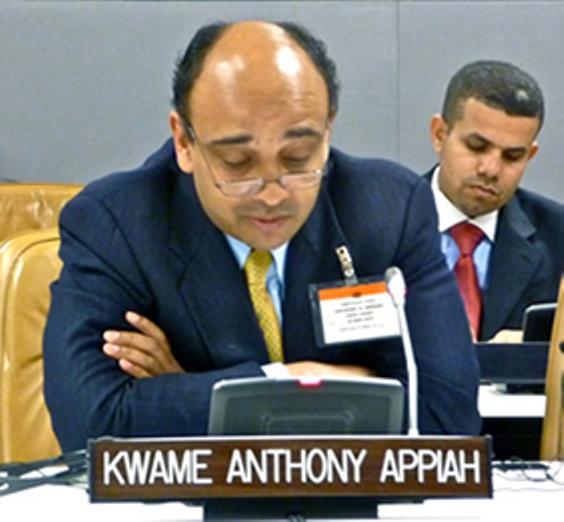Professor Appiah sums up democratic philosophy in UNDEF Advisory Board debut

Anthony Kwame Appiah, Laurance S. Rockefeller University Professor of Philosophy at Princeton University and a member of the UNDEF Advisory Board for 2010-11, spoke at the Board's Spring meeting on 29 March. His remarks were a concise yet profound reflection on the nature and philosophy of democracy:
"The trouble with most accounts of democracy is that they want to insist that it has a simple definition and a few virtues. But democracy, which emerged in the modern world, in response to monarchy and empire, has many elements and many inter-connected virtues, which are mirror images, if you like, of the vices of the Ancien Régime. In democracies, unlike monarchies and aristocracies, elites have to live with the discipline of knowing that they may be replaced; and they have to permit public criticism, from which they can learn about the impacts of their decisions on the life of their citizens, and through which citizens can organize to replace as well as to support them. There is no life-tenure; there is no lèse majesté. And since citizens are engaged in assessing government because they have a role in choosing the governors, they need information and education to do their job well.
In democracies, unlike empires, government reflects the characters of the citizens, is local rather than remote, and treats every subject as an equal person. No more can the fact of ethnicity count as a reason to chose one person’s interest over another’s: and the point is soon generalized, so that it is not just race and ethnicity that are no longer sufficient grounds for discrimination, but nor is social class or caste or, most importantly, gender and religion. Sexual orientation is increasingly on the list of inadmissible grounds for discrimination; so is disability. In democracies, citizens are not subjects: they are free to make their lives according to their own conceptions of what is worth having and doing and being, provided they respect the rights of others to do the same. And, as equals, they are entitled to respect: from the state, from each other. To make all this possible, citizens need rights: of free expression and association, to bodily integrity, to the basic health, shelter and nutritional needs without which a life of human dignity is not possible. And so democracies, committed to the dignity and equality of their citizens, seek to ensure these things.
These many good things that flow from democracy are best understood, I believe, as flowing from the idea that adult citizens are entitled to manage their own lives. This is required by the fundamental image of human dignity that is rightly mentioned in the preamble to the Universal Declaration of Human Rights. In securing that dignity, the state can be an essential aid, both because it helps organize social traffic, keeping citizens out of each other’s way, and because it provides goods that families and smaller groups cannot easily achieve on their own. If people are to manage their own lives -- as individuals, in families and through social associations--the government will work best if it is sensitive to what they need to make their lives and responsive to their objections to the state’s interventions and to their requests for aid. One central ideal in helping to assure this is a principle of subsidiarity, which requires that local decisions be made locally; another is the recognition that government is only needed in some spheres of life, while others will be managed well by independent elements of civil society.
In a world where government is guided by these many aims, NGO’s will have many vital contributions to make. They will act locally to allow free citizens to solve their own problems, through the power of free association; they will articulate local concerns to government when its help is needed; they will provide citizens, both locally and through national media, with the materials to assess the elites who run the state, and to decide whether they want to change them. They can help to create the educated and informed citizenry at the local level that democracies require, and to disseminate the very democratic values--freedom, equality, mutual respect--that guide democracy and make it work. But they can also act at the very highest global levels--across the boundaries of nations--to bring together like-minded people from many societies to assure that every government secures the very goods that government exists to protect: a life in freedom, associating freely in the pursuit of goods that the citizen herself approves. I have the honor to have been elected to the Presidency of the PEN American Center; and one of our jobs as an NGO is to criticize our own government, when it fails to live up to the highest standards of respect for free expression, and to join with the other 145 PEN Centers in 100 countries to put pressure on other governments when they fall victim to the same temptations. I believe our willingness to criticize our own government strengthens our ability to criticize others. So it's a great honor to be involved with UNDEF and I look forward to joining you all in its work."
Dr. Appiah, who grew up in Ghana and the United Kingdom, has taught philosophy and African studies at the University of Ghana, Cambridge, Duke, Cornell, Cornell, Yale and Harvard. He joined the Princeton faculty in 2002 as Laurance S. Rockefeller University Professor of Philosophy and the University Center for Human Values. He is also associated with Princeton’s Center for African American Studies and Programs in African Studies. Dr. Appiah’s published work includes In My Father’s House, which won the Herskovitz Prize for African Studies, Colour Conscious: The Political Morality of Race (with Amy Gutmann), The Ethics of Identity, and Cosmopolitanism: Ethics in a World of Strangers. As an intellectual bridging the global South and North, as well as the worlds of philosophy and of African studies, he adds a unique perspective to the work of UNDEF.


